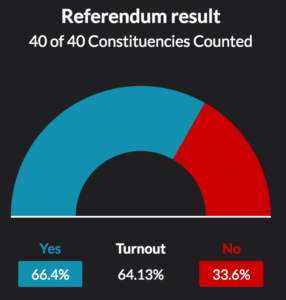I’m stunned by the outcome of the referendum on abortion in my native land. I expected it to be close, and watched with distaste the attempts by the American fanatical anti-choice movement to influence the campaign. I thought the Yes campaign would win, but suspected that it would be by a narrow margin (as in the Brexit referendum in the UK). And I expected that the result would reflect the growing urban/rural divide in Ireland.
I was wrong about all this. Two thirds of my fellow-citizens voted to repeal a previous amendment to the Constitution that effectively banned abortions in the Republic. And as for my idea about the urban/rural divide — well, only a single constituency (Donegal) voted against repeal — and then only by a narrow margin (51.9% to 48.1%).
The Irish Times columnist, Una Mullally, summed it up nicely:
We were told this was a divisive campaign. It was a unifying campaign. We were told this was a difficult issue for people, yet for many it was straightforward. We were told it was the third rail of Irish politics, so instead, the people led, from the activists and protestors to the canvassers and ordinary women and men who rolled up their sleeves, to the Citizen’s Assembly, to the women who shared their abortion stories. We were told about Middle Ireland. There is no Middle Ireland. Just Ireland. Its islands, villages, cities, towns, coasts, midlands, mountains, estates, flats, and fields. This campaign was intergenerational. Younger activists stood on the shoulders of those gone before them, and brought an energy, fearlessness, creativity and sense of unrelenting determination and optimism that inspired people across the board. The brilliantly eclectic make-up of the campaign brought in doctors, mothers, lawyers, students, trade unionists, the LGBT community, feminists, and everyone in between.
Who did the No campaign really have in the end, apart from a cabal of fringe fundamentalists whom no one can really understand how or why they have gained such a platform and unfettered access to the media? The No campaign drove recklessly and ended in a car crash. They alienated undecided voters at every juncture with extreme messaging. In the final weeks, the No campaign acted as an asset to the Yes campaign, with spokesman John McGuirk, who revelled in bizarre statements, and campaigners such as Ronan Mullen getting short shrift, particularly when he disrespected a woman who shared her abortion story in a television debate. No amount of media training could connect No campaigners with the public.
This is now the second referendum that my fellow-citizens have surprised the world. In 2015 they voted 62.1% to 37.9% to legalise same-sex marriage. And again only one constituency in the entire country voted against.
This is getting to be a habit. Long may it continue.

